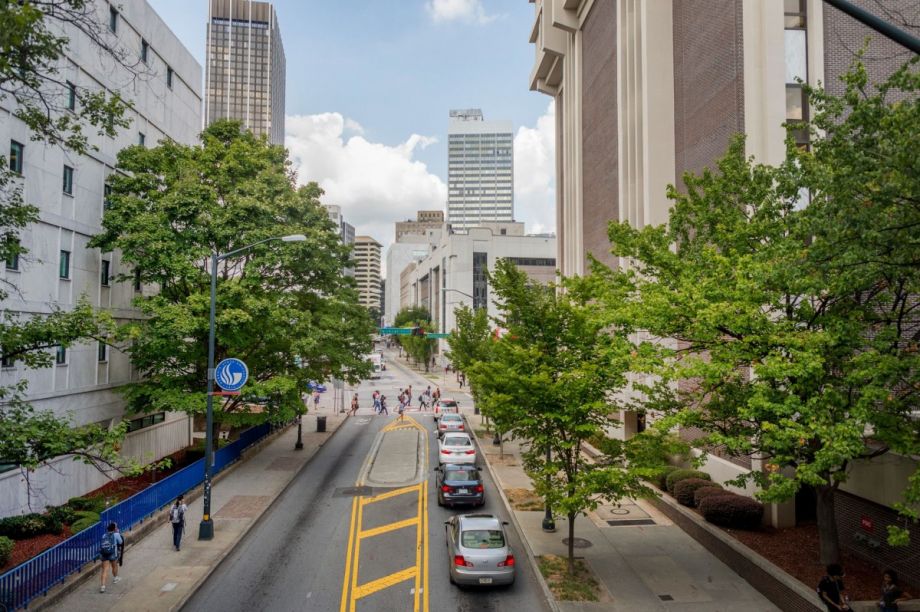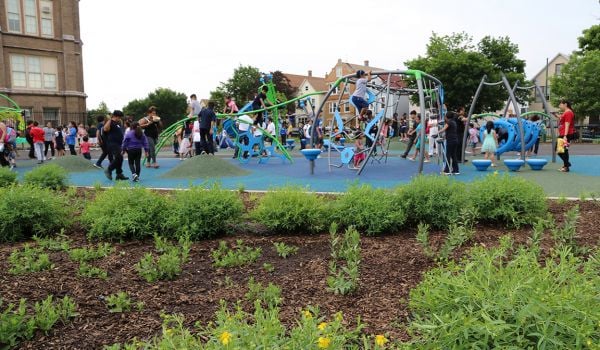Atlanta is heating up. By 2050 the city will be hotter, experiencing more severe droughts and floods, as the impact of global climate change comes home to roost. Atlantans will bear the brunt of these changes unequally. The effects of urban heating are already disproportionately impacting communities of color and low-income neighborhoods; a trend repeated ad nauseam across America’s major urbanized areas that reflect the persistent environmental injustices of redlining, white flight, and postwar urban renewal. Yet, with coastal areas like Miami staring down the existential realities of rising sea levels, Atlanta is expected to welcome millions of climate refugees in the coming decades. Climate change will undoubtedly be a key factor shaping the city’s future. The question is not whether cities like Atlanta will transform in response to these unprecedented drivers, but who will and should be a part of, and lead, these changes?
While climate change denialism and fossil fuel dependency continue to present significant political roadblocks, there are encouraging calls for fundamental change emerging across the domains of politics, finance, academia, and practice when it comes to dealing with climate change.
In Fall 2021, the Sustainability Lab at Georgia State University’s Urban Studies Institute initiated the Atlanta Transformative Leaders Series, a cross-sectoral urban dialogue. These monthly webinars have connected engaged citizens to the city’s climate resilience movers and shakers – a vital step in creating a community of practice capable of generating a more sustainable and resilient future for all Atlantans. Participants in the Transformative Leaders Series have delved into topics ranging from community empowerment, participatory planning, climate justice, and project funding to deep industry knowledge, analytics, and machine learning. In doing so, they have pinpointed both the significant milestones they’ve achieved in their organizations and the barriers they’ve needed to face – and overcome – in moving conversations around climate change and equitable urbanism forward. A major takeaway has been the need to demystify the governance of sustainability transitions via more cooperative, dynamic, and multidisciplinary engagements that could truly transform the way we are currently planning for our cities and utilizing services. As emphasized by Jario Garcia, Executive Director of the Urban Climate Nexus, “there has to be a strong collaboration among all sectors - specifically academia, community, and governments need to be involved in the solutions.”
One of the clearest challenges identified in these conversations is that current disciplinary silos leave our climate leadership short of the necessary capacities to effectively tackle the ongoing and future challenges facing our cities. Globally, there is a growing recognition of the dramatic changes needed to move cities toward more desirable futures, with unprecedented problems like climate change, failing infrastructure, and social inequities requiring novel and adaptive solutions. These problems entail understanding a wide range of social, economic, and environmental challenges, which involve unpacking complex interlinkages, uncertainties, and conflicts of values.
We need a new type of graduate, a leader in transformative change, equipped with the necessary skills and capacities to shift paradigms, perspectives, and policy radically. Today’s undergraduates and individuals already active in this arena and interested in attaining a graduate degree are keen to build flourishing urban societies. And they are increasingly demanding interdisciplinary, solutions-based training and scholarship.
In response, Georgia State is pioneering a distinct model of graduate education via the new Center for Urban Transformation. An NSF-supported initiative, grounded in systemic collaboration across academic units ( Urban Studies Institute, Geosciences, Public Health, the College of Law, the Neuroscience Institute, and Public Management and Policy), the Center aims to cultivate co-produce capacities for innovative research agendas that advance sustainability transformations. By supporting students in developing the necessary skills to understand complexity better and learn through dialogue and communication collectively while consistently engaging in deep reflection, the Center’s animating pedagogy of co-production intends to foster the much-needed transformative leaders of tomorrow.
For David Iwaniec, Principal Investigator and Co-director of the Center, there is a pressing need to train graduate students to formulate relevant research questions and ideas that can better address critical societal challenges with potentially transformative outcomes: “I think this is important and exciting,” says Iwaniec, “we’re not only interested in helping build transformative capacity among the next generation of urban sustainability scholars and professionals, but in developing an approach to urban studies and education that marries policy significance and a commitment to equitable and inclusive forms of urban development – one that can make a lasting impact locally, and in cities around the world.” Over the next five years, the Center for Urban Transformation aims to re-conceptualize graduate education on urban systems through integrating a collaborative and experimental transdisciplinary curriculum with a series of knowledge mobilization grants and showcase events designed to support robust researcher-practitioner networking. These activities promise to empower the next generation of transformation leaders in urban sustainability – scientists, decision-makers, and community partners – to create better futures for urban communities
Cities like Atlanta will be hit hard by the realities of global climate change. But these realities stress the importance of embracing urban centers as vital laboratories to foster innovative solutions and reimagined sustainable and resilient futures. Understanding what capacities students, researchers, practitioners, and communities need to advance sustainability transformations is an essential piece of the puzzle. Embedding transdisciplinary education, co-learning, and collaboration in how we approach future urban studies research, teaching, outreach, and action is therefore essential to help us envision, and ultimately realize, more sustainable and positive urban futures.
Click here to learn more about USI’s interdisciplinary Master (MIS) and Ph.D. degree programs. The MIS is accepting applicants for Fall 2022 admission by April 1 and June 1.
Lelani Mannetti is an Assistant Professor at the Urban Studies Institute at Georgia State University. She studies climate transformations, adaptations and sustainability.
Jean-Paul Addie is an Associate Professor and Graduate Program Director at the Urban Studies Institute at Georgia State University. He is a critical urban geographer working on urban and regional governance, urban political economy and socio-spatial theory, with a specific focus on the politics of infrastructure. His research and teaching are animated by a commitment to inclusive urbanism and addressing questions of access, mobility and social justice in an era of global urbanization.
















